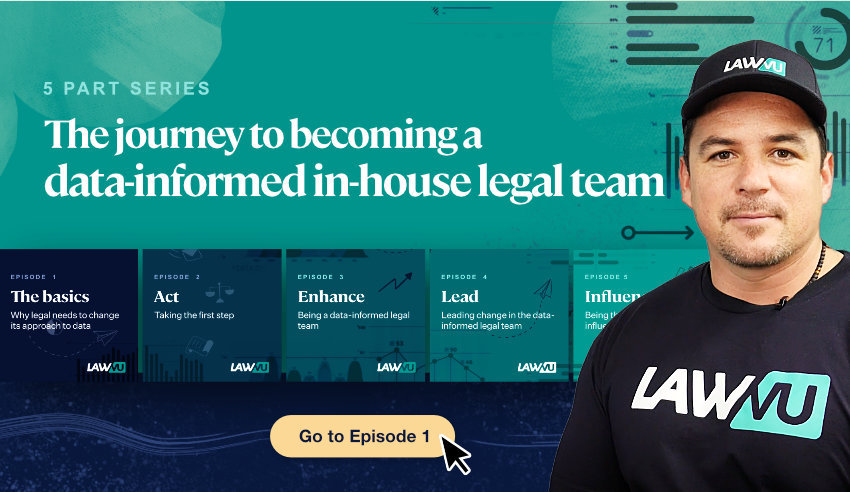There’s a lot of talk in the legal sector about metrics and analytics, so what are some practical steps you can take now to introduce more data into your daily work?
There’s a lot of talk in the legal sector about metrics and analytics, so what are some practical steps you can take now to introduce more data into your daily work?
Becoming a data-informed in-house legal team means starting conversations around where to find your data, how to use it, and why it’s a valuable asset for your team and wider organisation. You don’t need to be a technical data scientist to leverage data! You’re sitting on a data goldmine - your emails, contracts, and conversations are full of data - you just need a strategy around how to harness it. Ultimately, you’ll find the use of data brings more successful business outcomes, thanks to decisions based on evidence rather than on theory and anecdotal accounts.
Why does your in-house legal team need to change its approach to data?
In-house legal teams are experiencing increases in workload, with a matching decline in resourcing to complete the work. It’s a common theme across the sector, and while it’s a challenging environment to be working in, it’s also an opportunity to investigate new ways of working.
Using data and therefore knowing the actual situation within your legal department, and indeed the wider organisation, helps to ensure decisions are the best they can be, and made with the latest information.
So if you’re wondering where to start, here are four tips to set you on the right path to becoming data-informed.
Determine where you are
Generally speaking, in-house legal departments are working from a place of hindsight, the perspective is retrospective, where data is gathered manually and used to generate static reports. The hindsight stage is where the other departments in the business, such as sales, marketing and finance, were years ago, but since developed solutions to address their needs.
Following hindsight, the next three stages are:
- insight, where real-time data sets are available for strategic business decisions;
- foresight, where there’s enough historical data that you know what’s likely to happen next;
- prescriptive analytics and amplified intelligence and automation, the final stage - your data has the ability to influence and proactively contribute to strategic decisions made within your organisation.
By having discussions about where your legal department sits on its data maturity scale, and evaluating where you want to be in the future, you have a place to start. You’ll also be able to evaluate what having the right data means in terms of being better prepared to answer questions from the wider business.
Choose your legal tech solution wisely
Often decisions to purchase legal tech are prompted by an acute need at a particular point in time, such as choosing a contract management solution just for contracts, or an e-billing solution just for spend management. While the solution may solve the initial problem, other problems still remain.
More time then needs to be spent on finding additional point solutions, more money needs to be spent, and there’s more effort required onboarding new technology.
These issues can be avoided by choosing a connected software platform, such as a Legal Workspace, that provides a holistic, central place for all legal work, from intake to insights.
Establish a system of record
If your legal team is still working out of email and spreadsheets, then it’s impossible to link activities and see the relationships and correlations between the matters and other activities.
The most effective way of establishing a system of record - your one source of truth - is to have a matter management solution, where each matter has a unique ID. This atomic unit means you can link anything to that matter, and start to build its story. For example you can see who’s doing the most work for a matter, how long it’s taking and what needs to be completed next.
When the data is captured in a system of record, it’s structured, and easily surfaced to be used in a more meaningful way.
Back your ideas with the data
The in-house legal team’s future is looking bright! Imagine… standardised data sets, benchmarking, metrics based on real-time data, and organisational playbooks where there’s a common approach across the industry that’s modern and data-informed.
“It’s easy for people to argue and push back against your ideas, your opinions, and your plans, but it’s very difficult for people to push back against data,” finds Tim Boyne, Co-founder and Chief Strategy Officer at LawVu. “So, if you’re able to use the basic data points to validate what you think should be done next, it helps to make a case and build momentum around an idea.”
Are you ready?
Join Tim Boyne, Co-founder and Chief Strategy Officer at LawVu as he takes you on a journey to becoming a data-informed legal team. He’ll give you some more insights into where to start, how to lead the change, and who to bring onboard to ensure your journey to becoming a data-informed in-house legal team is a huge success.
We're evolving — and so should your insights. Heads up — Lawyers Weekly is going premium from 1 May for just $5 a month. Stay informed without missing a beat. More information coming soon.
““So, if you’re able to use the basic data points to validate what you think should be done next, it helps to make a case and build momentum around an idea.”
— Tim Boyne, Co-founder and Chief Strategy Officer at LawVu.







